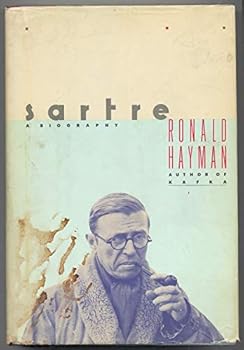Sartre: A Life
Select Format
Select Condition 
Book Overview
Photos. Notes. Biblio. Index. Chronology. This description may be from another edition of this product.
Format:Hardcover
Language:English
ISBN:0671454420
ISBN13:9780671454425
Release Date:January 1987
Publisher:Simon & Schuster
Length:572 Pages
Weight:2.05 lbs.
Customer Reviews
1 rating
THE FIRST COMPREHENSIVE BIOGRAPHY OF SARTRE
Published by Thriftbooks.com User , 15 years ago
Ronald Hayman is an English author most famous for his biographies (e.g., A Life of Jung; Nietzsche: The Great Philosophers (The Great Philosophers Series); Marquis de Sade: The Genius of Passion, etc.). This book is the most extensive biography yet written of Sartre; perhaps someday a more comprehensive one will be written with access to all of the "personal papers and effects," etc.; but until then, this book more than fills the bill. Hayman notes the incomplete nature of many of Sartre's works. "Though he managed to compete nine original plays, seven short stories, and several screenplays, nearly all his other major projects in literature were abandoned.... If his energy had not been diverted into political action, he might have tried harder to complete literary and philosophical projects, but this is by no means certain." Hayman fills in many details of Sartre's life. For example, in 1932 French political scientist Raymond Aron told him, "if you're a phenomenologist, you can talk about this drink, and that's philosophy." Hayman notes that "Sartre could not hide his excitement." About his brief work as a philosophy teacher, Hayman observes, "In his classroom Sartre would relax, sitting on a table and chatting with equal informality about philosophy and his own habits." Sartre's crucial relationship with Simone de Beauvoir has been chronicled by her in much greater detail (see her The Prime of Life: The Autobiography of Simone De Beauvoir; Force of Circumstance: The Autobiography of Simone de Beauvoir; All Said and Done; and Adieux: A Farewell to Sartre) than in Hayman's book. About Sartre's book Saint Genet: Actor and Martyr, Hayman writes, "Genet is more than a pretext, but less than a subject." About the break between Sartre and Camus in 1951, Sartre said, "Many things brought us together, few divided us. But those few were still too many." About Sartre's famous rejection of the Nobel Prize for Literature in 1964, Hayman wrote, "Sartre's worldwide fame was enhanced more by the rejection of the prize than it would have been by acceptance." Hayman's book---while not a "tell all" account---contains many intimate and unflattering details about Sartre's life. (Apparently Sartre was not particularly concerned with "the Other" when it came to lovemaking, for example.) Sartre also admitted that he "abused drugs a great deal," but particularly in his continual use of orthodrine and acorydane capsules while writing his Critique of Dialectical Reason (Vol. 1-2). Nevertheless, Sartre later announced in the seventies that "I am no longer a Marxist." This biography is highly recommended for students of Sartre, of modern philosophy, or of culture in general.





